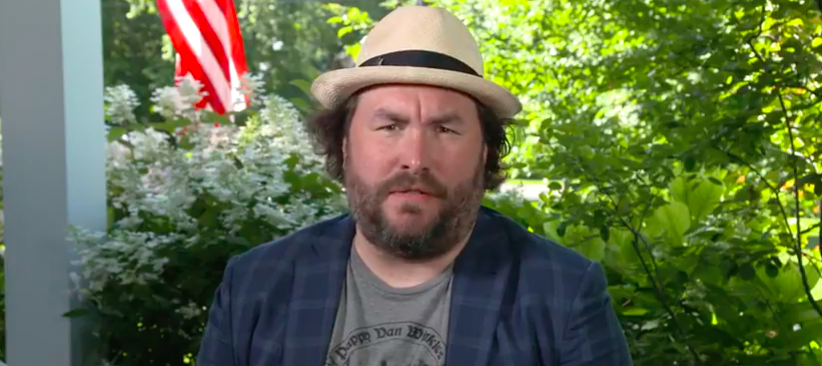ESPN’s Wright Thompson is widely regarded as one of the best sportswriters and storytellers working today. You’ve probably caught his work across a variety of ESPN platforms whether on the website, the magazine, or on television. Thompson is certainly gifted and uses his unique voice to tell the stories of athletes from Tiger Woods to Conor McGregor to Hurricane Katrina survivors.
One platform where Thompson’s voice is not present is Twitter. He quit the platform years ago and has still not returned.
My friend Wright Thompson has quit Twitter without my permission. Seriously, without the distraction, WT's work will get even better. Watch.
— Don Van Natta Jr. (@DVNJr) October 4, 2014
This week Thompson doubled down on his explanation for quitting Twitter when appearing on Don Van Natta and Jacob Feldman’s Sunday Long Read Podcast along with fellow ESPN writer Seth Wickersham.
The discussion takes place at about the 58:30 mark in the podcast. The whole thing is definitely worth listening to if you’re interested at all in sportswriting or just the process of being a writer in general. Ironically enough, it was transcribed by another ESPN Twitter who quit Twitter and published by Wickersham where else, but on Twitter.
On the SLR pod, Wright Thompson told me and @DVNJr why he quit Twitter. So of course, KVV, who also quit, transcribed it. And of course, I’ll tweet it.https://t.co/Y3iIB7bjbk pic.twitter.com/iiCdzvo8zV
— Seth Wickersham (@SethWickersham) December 12, 2017
The best part is when Thompson was told that his comments on Twitter would then immediately be posted on Twitter he replied, “that’s meta.”
The latest
It’s true that Twitter has begun to wear down a lot of people. Many prominent public figures have decided to quit the platform because it’s better overall for their health. And to be honest, who can blame them? Why would you want to read some Twitter egg or Twitterbot cursing you out or threatening you when you don’t have to? If there’s one thing you can criticize Twitter for, it’s that the platform has been far, far behind the curve in appropriately dealing with abuse on the platform. When Twitter is just this month starting to enforce policies against hate speech and neo-Nazis something is definitely wrong.
And in the tiny universe of sports media, we’ve seen the downside of Twitter far too often. There has been abuse towards popular personalities who dare to speak out about important issues, especially abuse towards women. Remember the #MoreThanMean video by Julie DiCaro and Sarah Spain that featured unsuspecting men reading the abusive tweets they received to their face? That was a heart-wrenching and jolting example of the kind of behavior that the platform enables. It wasn’t a late night jokey haha “mean tweets” gag for a few laughs. That was a painful reminder about the harm Twitter can do and the realities of what Thompson says is the “distillation of our worst selves.”
Then there are the seemingly countless individuals who have indeed lost their job or been suspended because of something they said on Twitter, either because they tried to make a joke and failed, didn’t think before they tweeted, or unabashedly aired backwards and regressive viewpoints. Twitter is a minefield and whenever you actually want to send a tweet you should be warned with a prompt that asks you whether you really, really, really want to do what you’re about to do. There’s a reason why “Don’t Tweet” has taken on mythical status on Twitter itself.
Those are all very, very good arguments against Twitter. But there are still many positives to the platform as well. Like any other social media platform, Twitter allows people to connect like never before. Just think about all the relationships that have been formed because of Twitter, all of the connections made, all of the positive steps that have happened in people’s lives. Where else could a random guy win not just a first date, but a second date with tennis phenom Genie Bouchard? What about helping to spread the word about worthy causes like the ALS Ice Bucket Challenge? Personally speaking, who knows where this website would be if it weren’t for the years of support and interaction on Twitter, which is by far our largest social media platform. (If there’s one piece where I’d disagree with Thompson it’s that, Twitter has definitely helped move the needle for years at this website.)
Need one final anecdotal piece of evidence that there’s still some use for Twitter? You can’t read through this Rick and Morty thread and tell me that Twitter hasn’t done anything good for the world.
Twitter is a microcosm of life and humanity. There are some good pieces and there are some bad. Does one outweigh the other? If you’re someone that has to deal with abuse on a regular basis or have lost a job for saying something stupid, then you’re probably aligned with Thompson. If you met the love of your life or grew a following that helped you move forward in your career, then you’re likely on the other side of the argument. Ultimately, it’s up to the individual person and your own experiences where you land and how much use you still have for Twitter.





